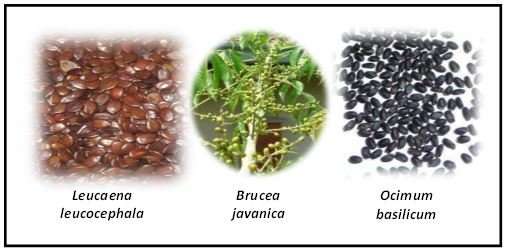Exploring the vast potential of non-edible seed oils

Biomass remains the primary source of energy for developing countries in the South-East Asian region. The share of biomass utilization for energy varies from as large as 50-75 percent in Laos, Myanmar, Cambodia and Vietnam to a much lower percentage (below 15 percent) in Indonesia, Philippines, Thailand and Malaysia. Previously, biomass was used only as primary energy source. However, the current trend is towards the utilization and manipulation of biomass to generate bioenergy and value-added bio-based chemicals. Due to the increasing concern towards environmental and fossil-fuel reserves security, considerable attention has been given to these undervalued resources.
Researchers at the Institute of Biological Sciences, Faculty of Science, University of Malaya currently works on several non-edible oil-bearing plants such as Leucaena leucocephala, Brucea javanica and Ocimum basilicum.
"Leucaena leucocephala is a fast-growing plant species, thus, highly suitable as an energy crop if the challenge to utilize its seed oils as well as lignocellulosic biomass could be overcome", according to the Lead Researcher, Dr. Zul Ilham.
From their findings, cellulose was successfully extracted from waste Leucaena leucocephala seeds and could be further converted to micro-crystalline and possibly nano-crystalline forms. It could be utilized as a cheap feedstock for cellulose as precursors of biocomposite manufacturing, suspension stabilizer and a water-retainer in cosmetics, foods and pharmaceutical industries. The seed oil of Leucaena leucocephala, was also found to be compatible for utilization in diesel engine.
On the other hand, Brucea javanica seed oil is not only good for conversion to biodiesel, but also display good anti-oxidation properties that helps prolong biodiesel storage capacity. It seed extracts (in methanol, ethyl acetate and hexane) contain several antioxidant compounds such as gallic acid, ellagic acid, quinic acid, brevifolin and strictinin, proven to improve biodiesel oxidation stability to meet the European standard.
In addition, Ocimum basilicum seed oil, which contains high amount of linolenic acid, is also suitable for conversion to biodiesel using enzymatic catalysis. It is low in free fatty acid and saturated fatty acids, which makes the resulting biodiesel excellent in cold-flow properties to survive winterization.
This research on utilizing non-edible seed oils as an alternative resources for bioenergy is important as conventional biodiesel is commonly produced from edible vegetable oils or animal fats, raising concerns that it may compete with food supply in the long-term. Hence, the recent focus to find oil bearing plants that produce non-edible oil feedstock for biodiesel production is interesting and worth to be explored.
More information: Preparation and characterization of cellulose and microcrystalline cellulose isolated from waste Leucaena leucocephala seeds, International Journal of Advanced and Applied Sciences (2017). DOI: 10.21833/ijaas.2017.03.009
Khalil Hasni et al. Optimization of biodiesel production from Brucea javanica seeds oil as novel non-edible feedstock using response surface methodology, Energy Conversion and Management (2017). DOI: 10.1016/j.enconman.2017.07.037
Khalil Ullah Hasni et al. Brucea javanica seeds as source of potential natural antioxidants to improve biodiesel thermal and oxidative stability, Malaysian Journal of Fundamental and Applied Sciences (2017). DOI: 10.11113/mjfas.v13n3.555
Zeynab Amini et al. Biodiesel production by lipase-catalyzed transesterification of Ocimum basilicum L. (sweet basil) seed oil, Energy Conversion and Management (2016). DOI: 10.1016/j.enconman.2016.11.017
Provided by University of Malaya



















